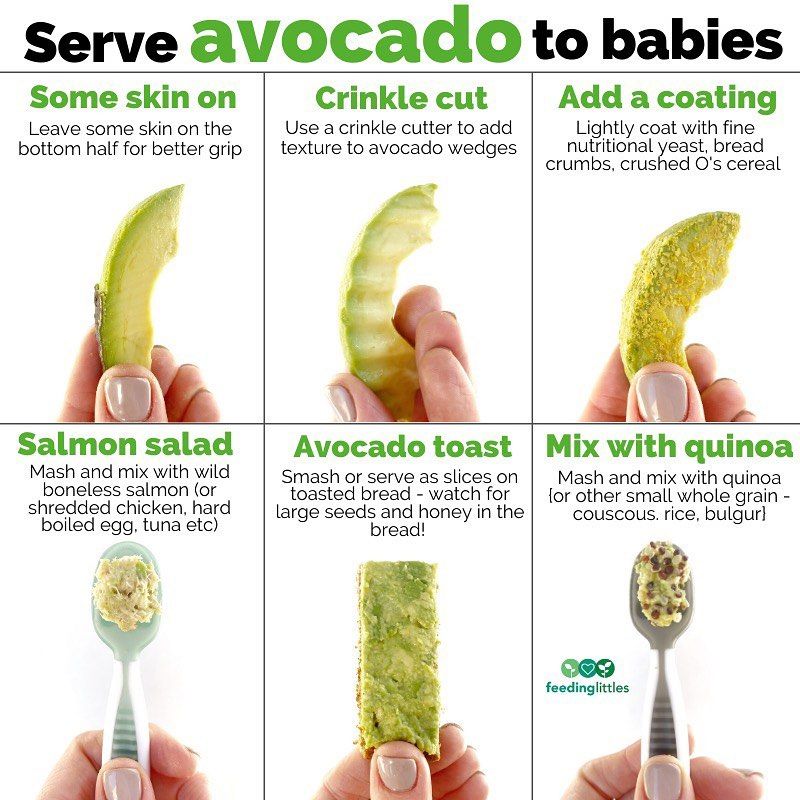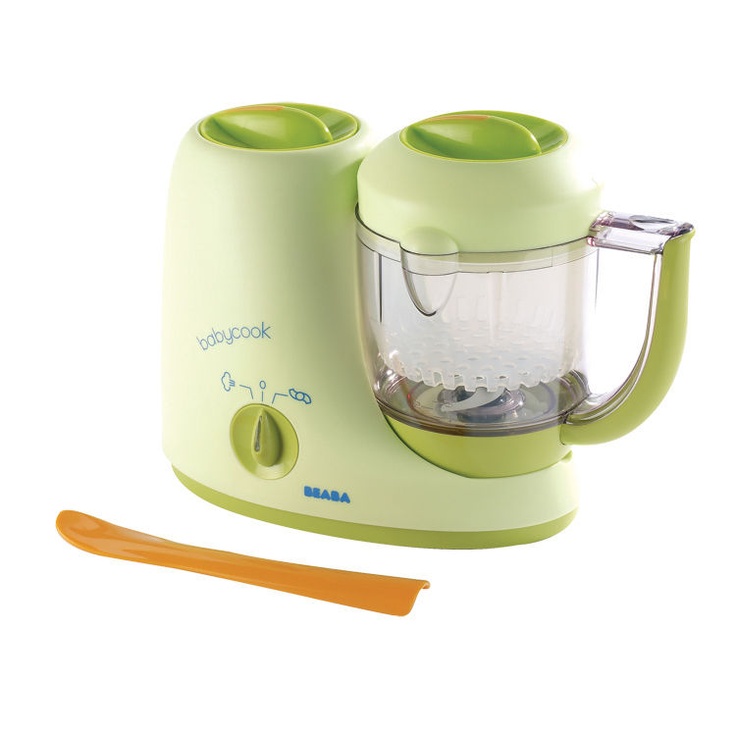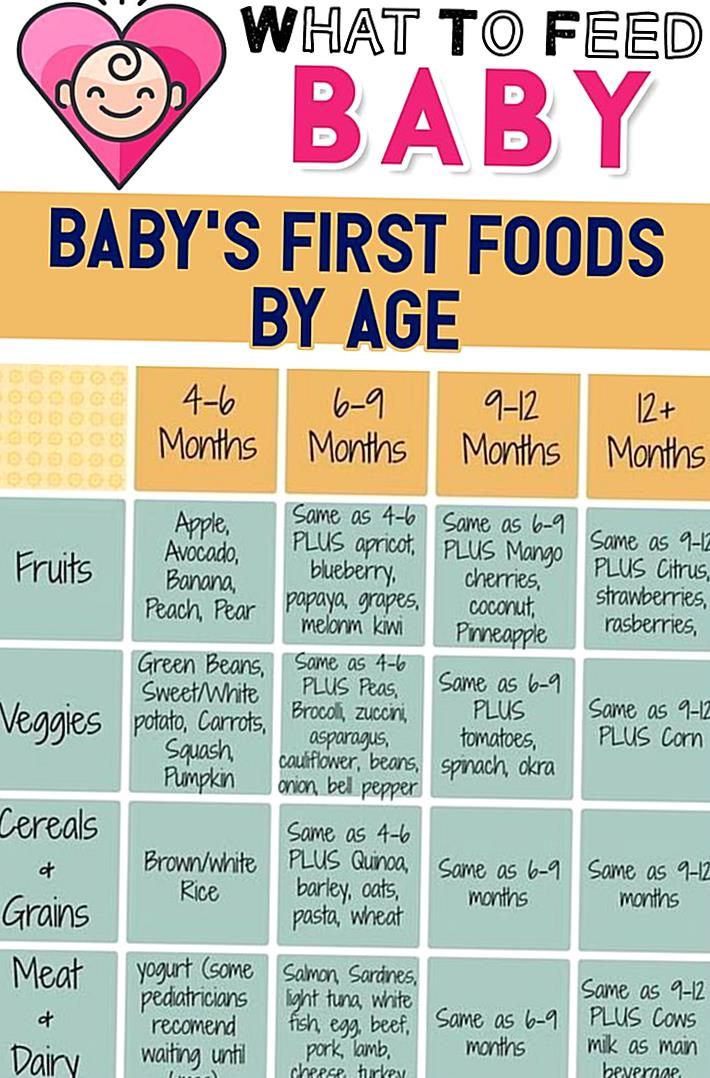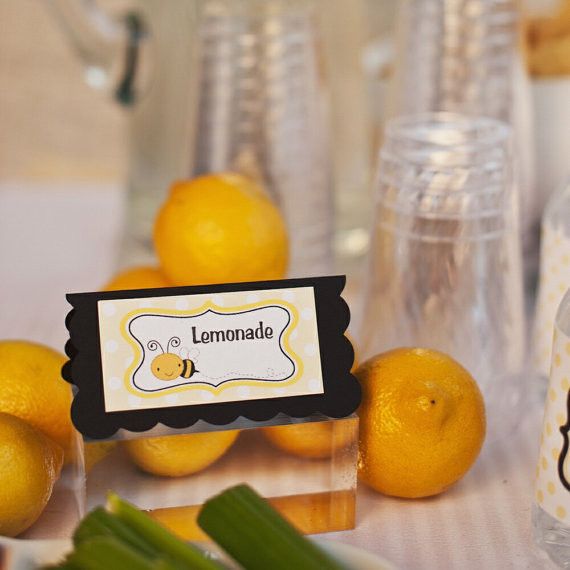Baby milk feed
Formula Feeding FAQs: How Much and How Often (for Parents)
Whether you plan to formula feed your baby from the start, want to supplement your breast milk with formula, or are switching from breast milk to formula, you probably have questions.
Here are answers to some common questions about formula feeding.
How Often Should I Feed My Baby Formula?
Newborns and young babies should be fed whenever they seem hungry. This is called on-demand feeding.
After the first few days of life, most healthy formula-fed newborns feed about every 2–3 hours. As they get bigger and their tummies can hold more milk, they usually eat about every 3–4 hours. As babies get older, they’ll settle into a more predictable feeding routine and go longer stretches at night without needing a bottle.
Talk to your doctor if you have concerns about feeding your baby, especially if your baby is very small, is not gaining weight, or was born early (prematurely).
How Can I Tell When My Baby Is Hungry?
Signs that babies are hungry include:
- moving their heads from side to side
- opening their mouths
- sticking out their tongues
- placing their hands, fingers, and fists to their mouths
- puckering their lips as if to suck
- nuzzling again their mothers' breasts
- showing the rooting reflex (when a baby moves its mouth in the direction of something that's stroking or touching its cheek)
Babies should be fed before they get upset and cry. Crying is a late sign of hunger. But every time your baby cries is not because of hunger. Sometimes babies just need to be cuddled or changed. Or they could be sick, tired, too hot or too cold, in pain, or have colic.
How Much Formula Should I Feed My Baby?
In the first few weeks, give 2- to 3-ounce (60- to 90-milliliter) bottles to your newborn. Give more or less depending on your baby’s hunger cues.
Here's a general look at how much your baby may be eating at different ages:
- On average, a newborn drinks about 1.5–3 ounces (45–90 milliliters) every 2–3 hours. This amount increases as your baby grows and can take more at each feeding.
- At about 2 months, your baby may drink about 4–5 ounces (120–150 milliliters) every 3–4 hours.
- At 4 months, your baby may drink about 4–6 ounces (120-180 milliliters) at each feeding, depending on how often they eat.
- By 6 months, your baby may drink 6–8 ounces (180–230 milliliters) about 4–5 times a day.
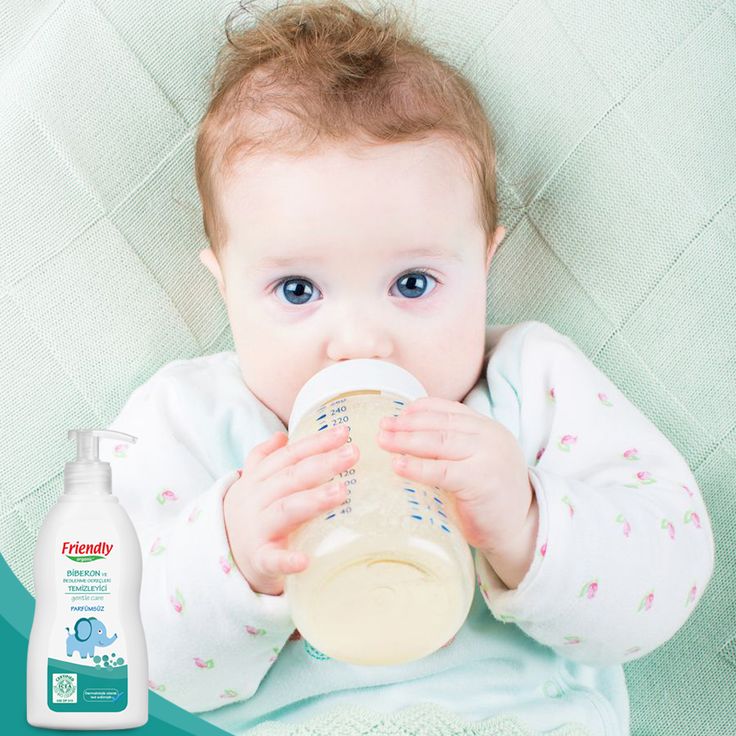
Watch for signs that your baby is hungry or full. Respond to these cues and let your baby stop when full. A baby who is full may suck with less enthusiasm, stop, or turn away from the bottle.
Why Does My Baby Seem Hungrier Than Usual?
As babies grow, they begin to eat more at each feeding and can go longer between feedings. Still, there may be times when your little one seems hungrier than usual.
Your baby may be going through a period of rapid growth (called a growth spurt). These can happen at any time, but in the early months are common at around:
- 7–14 days old
- between 3–6 weeks
- 4 months
- 6 months
During these times and whenever your baby seems especially hungry, follow their hunger cues and continue to feed on demand, increasing the amount of formula you give as needed.
Is My Baby Eating Enough?
At times, you may wonder whether your baby is getting enough nutrients for healthy growth and development.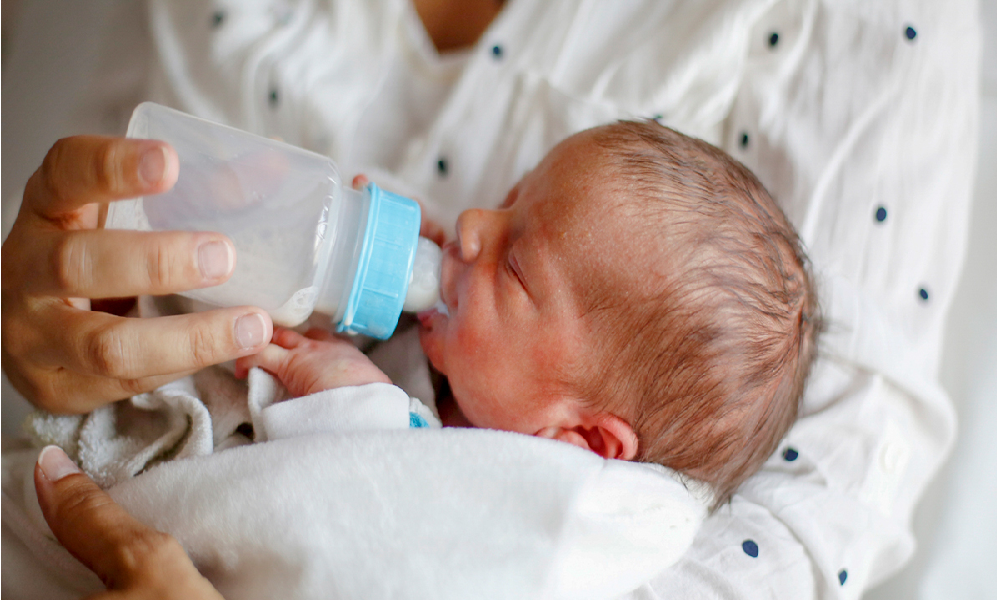 Babies who get enough to eat seem satisfied after eating and are regularly peeing and pooping.
Babies who get enough to eat seem satisfied after eating and are regularly peeing and pooping.
At your baby’s checkups, the doctor will review your baby’s growth chart, track your little one’s development, and answer any questions. Talk to your doctor if you have any concerns about your baby’s feeding and nutrition.
Reviewed by: Mary L. Gavin, MD
Date reviewed: November 2021
Amount and Schedule of Baby Formula Feedings
- In the first week after birth, babies should be eating no more than about 1 to 2 ounces (30 to 60 ml) per feed.
- During the first month, babies gradually eat more until they take 3 to 4 ounces (90 to 120 ml) per feed, amounting to 32 ounces per day. Formula-fed babies typically feed on a more regular schedule, such as every 3 or 4 hours. Breastfed babies usually take smaller, more frequent feedings than formula-fed infants.
If your baby sleeps longer than 4 to 5 hours during the first few weeks after birth and starts missing feedings, wake them up and offer a bottle.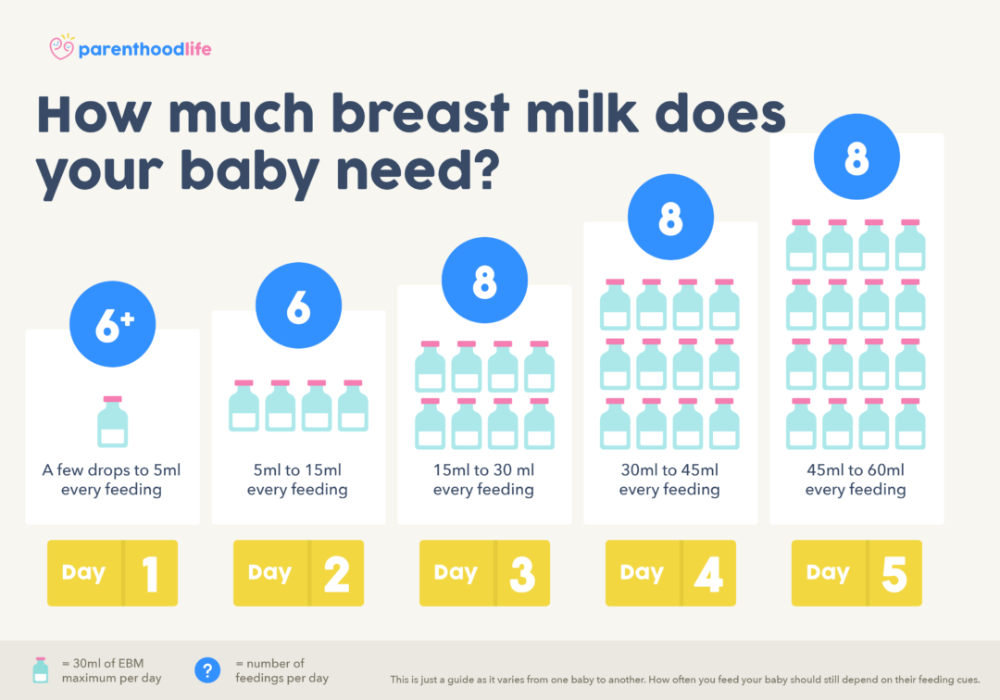
By the end of the first month: Your baby will be up to at least 3 to 4 ounces (120 mL) per feeding, with a fairly predictable schedule of feedings about every 3 to 4 hours.
By 6 months: Your baby will consume 6 to 8 ounces (180–240 mL) at each of 4 or 5 feedings in 24 hours.
Formula feeding based on body weight
On average, your baby should take in about 2½ ounces (75 mL) of infant formula a day for every pound (453 g) of body weight. But they probably will regulate their intake from day to day to meet their own specific needs, so let them tell you when they've had enough. If they become fidgety or easily distracted during a feeding, they're probably finished. If they drain the bottle and continues smacking their lips, they might still be hungry.
There are high and low limits, however. If your baby consistently seems to want more or less than this, discuss it with your pediatrician.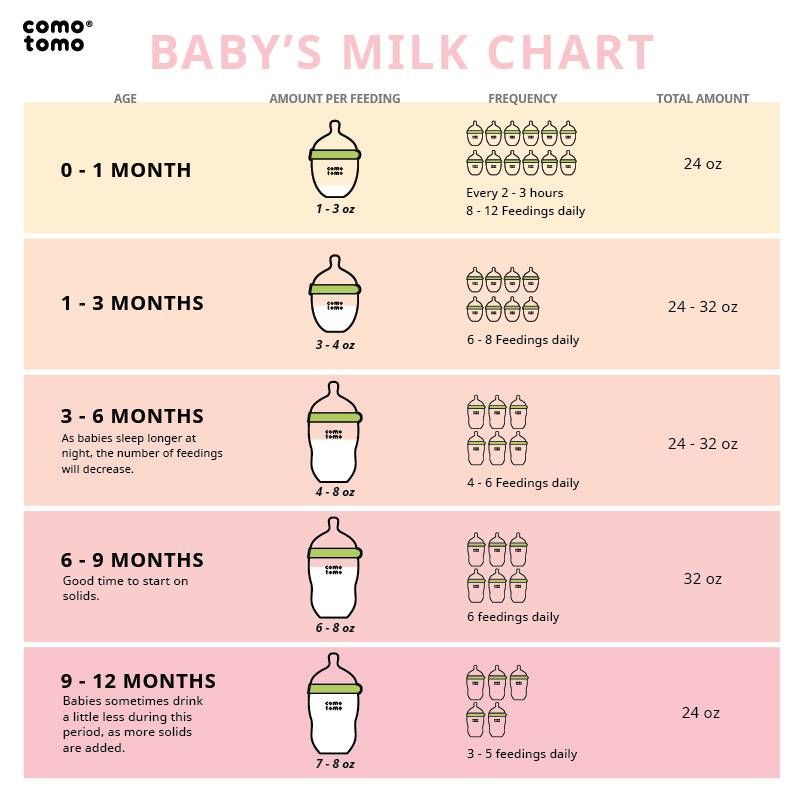 Your baby should usually drink no more than an average of about 32 ounces (960 mL) of formula in 24 hours. Some babies have higher needs for sucking and may just want to suck on a pacifier after feeding.
Your baby should usually drink no more than an average of about 32 ounces (960 mL) of formula in 24 hours. Some babies have higher needs for sucking and may just want to suck on a pacifier after feeding.
On-demand feeding
Initially it is best to feed your formula-fed newborn a bottle on demand, or whenever they cry with hunger. As time passes, your baby will begin to develop a fairly regular timetable of their own. As you become familiar with their signals and needs, you'll be able to schedule their feedings around their routine.
Eating & sleeping patterns
Between 2 and 4 months of age (or when the baby weighs more than 12 lb. [5.4 kg]), most formula-fed babies no longer need a middle-of-the-night feedings. They're consuming more during the day, and their sleeping patterns have become more regular (although this varies considerably from baby to baby). Their stomach capacity has increased, too, which means they may go longer between daytime feedings—occasionally up to 4 or 5 hours at a time.
If your baby still seems to feed very frequently or consume larger amounts, try distracting them with play or with a pacifier. Sometimes patterns of obesity begin during infancy, so it is important not to overfeed your baby.
Getting to know your baby's feeding needs
The most important thing to remember, whether you breastfeed or bottlefeed, is that your baby's feeding needs are unique. No book―or website―can tell you precisely how much or how often they need to be fed or exactly how you should handle them during feedings. You will discover these things for yourself as you and your baby get to know each other.
More information
- How Often and How Much Should Your Baby Eat?
- Making Sure Your Baby is Getting Enough Milk
- Is Your Baby Hungry or Full? Responsive Feeding Explained (Video)
- Remedies for Spitty Babies
- Last Updated
- 5/16/2022
- Source
- Adapted from Caring for Your Baby and Young Child: Birth to Age 5 7th Edition (Copyright © 2019 American Academy of Pediatrics)
The information contained on this Web site should not be used as a substitute for the medical care and advice of your pediatrician. There may be variations in treatment that your pediatrician may recommend based on individual facts and circumstances.
There may be variations in treatment that your pediatrician may recommend based on individual facts and circumstances.
Baby milk food with free home delivery from VkusVill
Filters
Default
-
Default
-
Price up
-
Descending price
1
Quick view
Drinking bioyoghurt for children with strawberries 2.5%
210 g
50 rub 50.00 50.00
2
Quick view0003
210 g
50 rub 50.00 50.00
3
Quick view0003
210 g
50 rub 50.00 50.00
4
Quick view0003
210 g
RUB 49 49.00 49.00
5
Quick view sugar 3. 2%
2%
210 g
RUB 45 45.00 45.00
6
Quick view0003
210 g
RUB 47 47.00 47.00
7
Quick view0003
210 g
RUB 47 47.00 47.00
8
Quick view0003
50 g
22 rub 22.00 22.00
9
Quick view
Biocurd for children with cherries 4.2%
100 g
42 rub 42.00 42.00
10
Quick view0003
100 g
RUB 42 42.00 42.00
11
Quick view0003
210 g
RUB 48 48.00 48.00
12
Quick view sugar 2. 5%
5%
210 g
RUB 49 49.00 49.00
13
Quick view0003
210 g
RUB 48 48.00 48.00
14
Quick view0003
210 g
RUB 48 48.00 48.00
15
Quick view0003
210 g
RUB 48 48.00 48.00
16
Quick view0003
210 g
RUB 48 48.00 48.00
17
Quick view0003
210 g
48 rub 48.00 48.00
18
Quick view sugar 2.9%
210 g
RUB 44 44.00 44.00
19
Quick View
Immunolife "Red currant-raspberry" 2. 5%
5%
210 g
54 rubles 54.00 54.00
20
Quick view
Drinking yogurt for children Cherry-Cherry 2.2%
200 g
48 rub 48.00 48.00
21
Quick view.00 49.00
22
Quick view
Baby milk-oatmeal porridge 2.5%
205 g
49 rub 49.00 49.00
23
Quick view
Baby milk-oat porridge with banana 2.5%
210 g
54 rub 54.00 54.00
24
Quick view
Baby milk-rice porridge with raspberries 2.5%
210 g0003
QUESTION-ANSWER
FREE PROVISION OF CHILDREN IN THE FIRST THREE YEARS OF LIFE WITH DAIRY PRODUCTS IN THE REPUBLIC OF TATARSTAN IN QUESTIONS AND ANSWERS.
(program “BELEKECH”)
1. Question : Who has the right to free of charge support for dairy products?
Answer : children of the first three years of life who are bottle-fed or mixed-fed, permanently residing in the Republic of Tatarstan, registered as an outpatient at the place of residence in a healthcare institution of the republic, belonging to preferential categories (Resolution of the Cabinet of Ministers of the Republic of Tatarstan dated December 31, 2009 No. 933)
2. Question : Why do other regions give food to all children, but we don't?
Answer: Federal Law of November 21, 2011 No. 323 “On the Fundamentals of Protecting the Health of Citizens in the Russian Federation” regulates the provision of adequate nutrition for children under the age of three upon the conclusion of a doctor, in accordance with the legislation of the constituent entities of the Russian Federation (Article 52).
In the Republic of Tatarstan, this is the Decree of the Cabinet of Ministers of the Republic of Tatarstan No. 933 dated December 31, 2009 “On the procedure for free provision of children in the first three years of life with special dairy products and mixtures according to doctor's prescriptions and financing of expenses for its organization”.
3. Question: Which categories of children are eligible for free dairy products?
Reply : children are eligible for benefits:
- From families with an average per capita income not exceeding the subsistence level established in the territory of the Republic of Tatarstan on the certificate of the Ministry of Labour, Employment and Social Protection of the Republic of Tatarstan.
- Children with chronic diseases who are medically indicated by a doctor:
- iron deficiency anemia,
- protein-energy deficiency of moderate and severe form (weight loss).

3. Children with HIV infection, children born to HIV-infected mothers.
4. Question : On the basis of what documents is food issued?
Reply : The main document for receiving meals is a prescription issued by a pediatrician at the clinic where the child is registered. When receiving products at a milk distribution point, you must present a prescription and a document confirming the identity of the recipient (parent). One of the parents has the right to receive food. Another recipient, along with a prescription and a document, must have a power of attorney from a legal representative (parent) to receive meals.
5. Question: What are the criteria for determining medical indications?
Answer: The decision to prescribe nutrition is made by the district pediatrician based on the results of clinical studies, clinical recommendations, standards of medical care.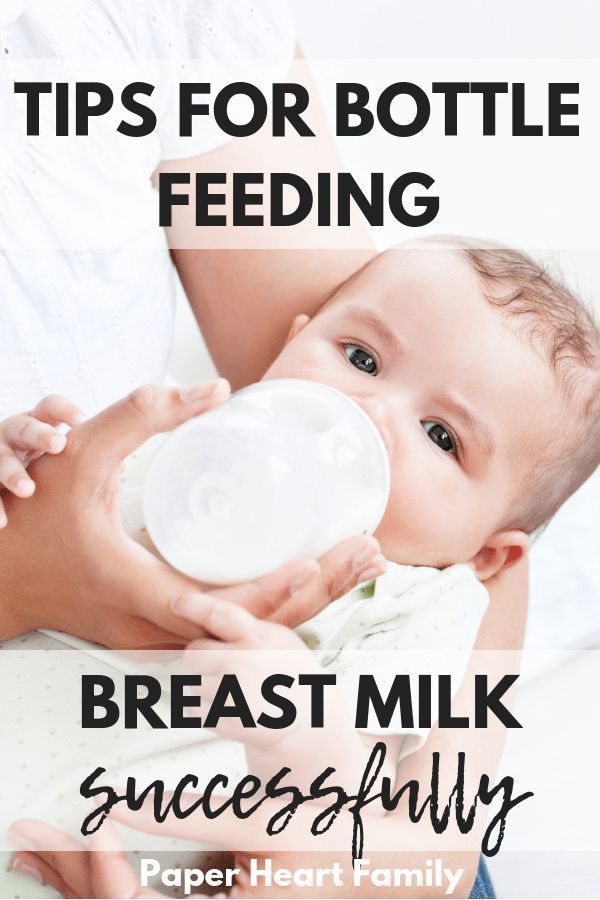
6. Question: In case of disagreement with the opinion of the local doctor, where can the parent apply?
Answer: A parent can apply to the head of the department, to the deputy head physician, to the head physician of the polyclinic.
7. Question: How often do I get a prescription for free meals?
Answer: Prescriptions for free food are issued by the district pediatrician once a month in two copies, one of which is given to parents, the other is kept in an outpatient clinic. This rule applies to all recipients of nutrition (medical, social indications).
8.Question: Why is a prescription for free baby food valid for 1 month?
Answer:
Since the number of children's dairy products (kefir, milk, cottage cheese, liquid adapted milk formula) must correspond to the number of recipients in each age category of each children's clinic, a prescription is issued once a month.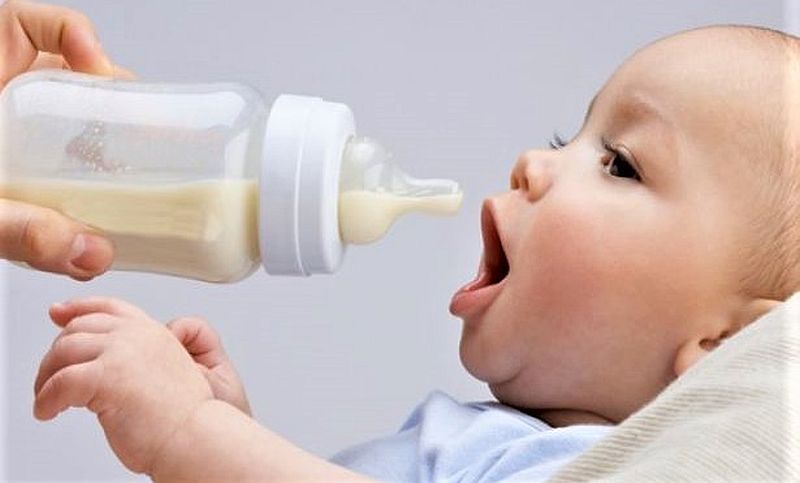
9.Question: How long is free baby food issued for?
Answer: The period of preferential provision of food for a child is determined by the period of validity of the benefit: the period of treatment of the disease or the validity period of a certificate issued by the Ministry of Labor, Employment and Social Protection of the Republic of Tatarstan, the age of the child (up to three years). There are no regulated terms for the duration of receiving baby food in the regulatory documents.
The period of validity of the certificate is established by the territorial department of the Ministry of Labour, Employment and Social Protection of the Republic of Tatarstan.
The term of treatment of the disease is determined by the local doctor in accordance with the current standards of medical care, clinical guidelines.
10. Question: How safe and of high quality are children's milk products of the Zelenodolsk Dairy Plant (ZMK)?
Answer: During the 10 years of the existence of the "Belakech" program, not a single case of adverse effects of ZMK products on the child's health has been registered.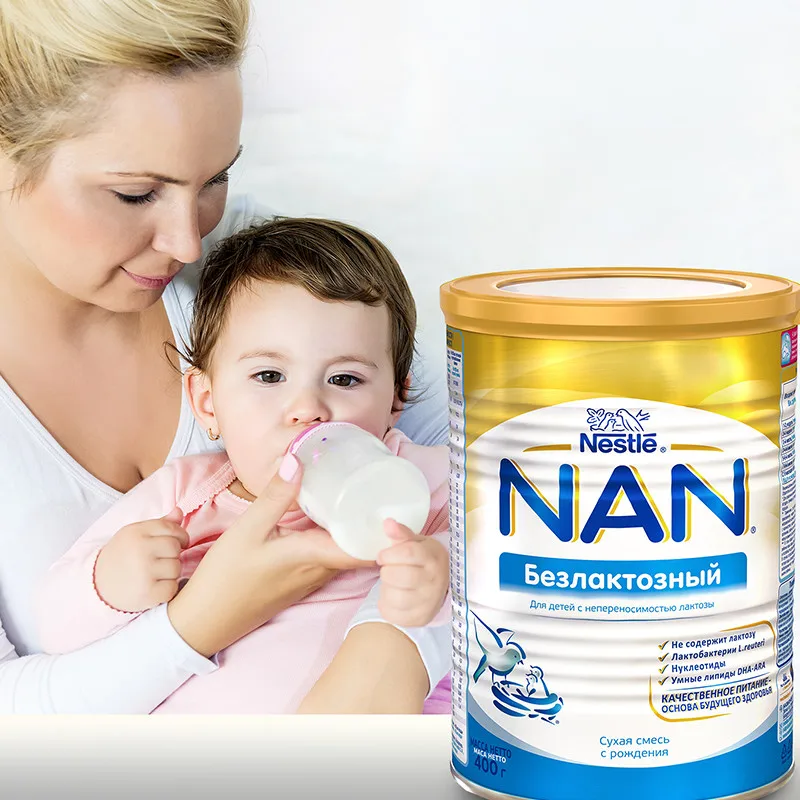 Milk for baby food is supplied only by the best enterprises of the Republic of Tatarstan, which have automated milk collection lines. The ZMK baby milk food production line is fully automated. ZMK baby milk products are certified and consist only of a natural product without the addition of preservatives or other additives. At all stages of the collection, transportation and manufacture of products, continuous monitoring is carried out. Each batch of products is delivered to milk distribution points with a certificate of conformity for this batch. Delivery of products from ZMK to milk distribution points is carried out in specialized vehicles equipped with refrigeration equipment.
Milk for baby food is supplied only by the best enterprises of the Republic of Tatarstan, which have automated milk collection lines. The ZMK baby milk food production line is fully automated. ZMK baby milk products are certified and consist only of a natural product without the addition of preservatives or other additives. At all stages of the collection, transportation and manufacture of products, continuous monitoring is carried out. Each batch of products is delivered to milk distribution points with a certificate of conformity for this batch. Delivery of products from ZMK to milk distribution points is carried out in specialized vehicles equipped with refrigeration equipment.
11. Question: How many children receive milk nutrition under the program “Belakach”?
Answer: 40,938 children.
12. Question: I live with a child in Kazan, registered in Pestretsy. Can I get baby milk food for a child in Kazan.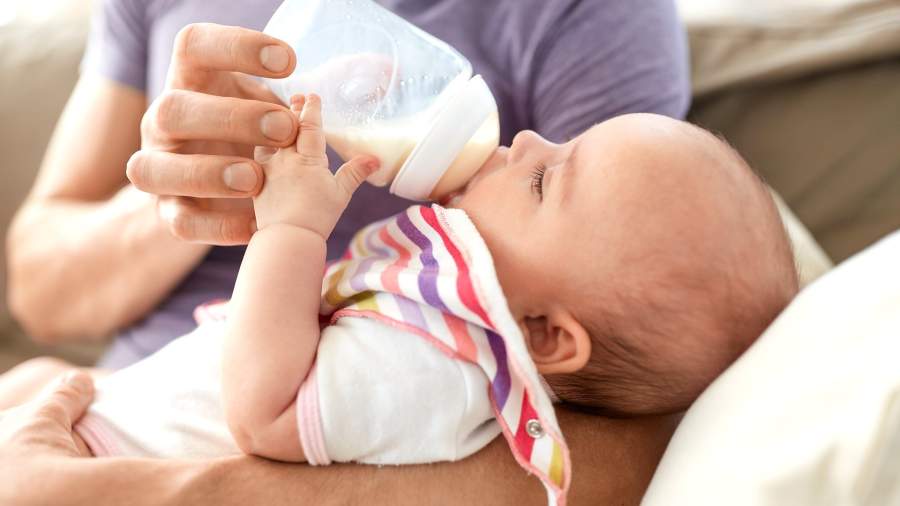
Answer: Yes, you can. To do this, you need to get a detachment at the clinic in Pestretsy and register with a children's medical institution at the place of residence in Kazan.
13. Question: My child has low hemoglobin, but the local pediatrician does not write out a prescription, he says it is not allowed. Why?
Answer:
The district doctor makes a decision on the need to issue a prescription for free baby food based on clinical and laboratory indicators, guided by the standards of medical care, clinical recommendations of leading pediatricians and pediatric nutritionists. At the same time, the doctor is obliged to explain the reason for the refusal to the parent of the child.
14. Question: How is the underweight of a child determined and in what case is it necessary to provide baby food?
Answer: The district pediatrician determines the child's weight deficit by the ratio of the child's actual weight to the due weight at this age (in percent) and, taking into account the dynamics of the child's development indicators, decides on the need to issue a prescription for free baby food.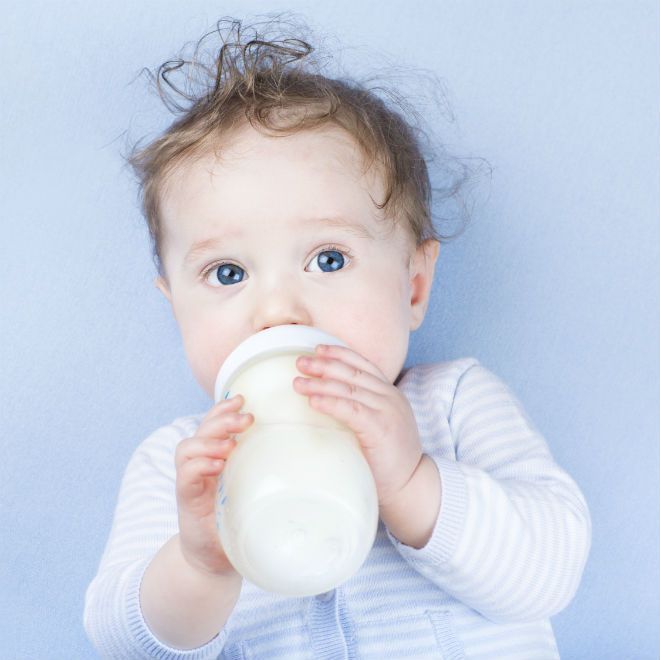
15. Question: What range of foods should a child receive under the Belacare program?
Answer: Child under 6 months of age. receives a liquid adapted milk formula - 200 ml per day.
Infants born to HIV-infected mothers and infants with HIV infection up to 6 months of age receive 800 ml of liquid formula milk per day.
Child over 6 months old up to 1 year receives:
- liquid adapted milk formula - 200 ml
- milk - 200 ml
- kefir - 100 ml
- cottage cheese - 30 gr.
A child aged 1 to 3 receives:
- milk - 200 ml
- kefir - 200 ml
- cottage cheese - 40 gr.
16. Question: If the mother was not able to get food on distribution days, what happens to this product?
Answer: Dairy products that the parent does not show up for within three days are considered unclaimed. Within one day, a medical organization redistributes unclaimed good nutrition in favor of newly registered children who are entitled to free provision of good nutrition.
Within one day, a medical organization redistributes unclaimed good nutrition in favor of newly registered children who are entitled to free provision of good nutrition.
A child whose parent does not show up for dairy products within three days is entitled to a full meal until the end of the grace period, excluding the days during which the meal was not provided.
17. Question: Who can get baby food in the dairy kitchen other than parents?
Answer: This may be a relative (grandmother, grandfather, sister, etc.) who must have a prescription and a power of attorney.
18. Question: My child gets free baby food but doesn't eat the kefir that is included in the meal package. Can I receive a set without kefir?
Answer: A measure of social support in the form of gratuitous provision of special dairy products and mixtures according to doctors' prescriptions (complete nutrition) is issued in full and is not divided into parts.
19. Question: I brought a certificate from social security to the local pediatrician on February 21. The doctor said that they would only put my baby on the baby food list from mid-March. Is it legal? And why can't I receive groceries from March 1st?
Answer: Medical institutions update the lists of children for receiving baby milk food every five days. Therefore, your child must be included in the application for infant milk formula from March 1st.
20. Question: My child and I live in Tatarstan, but we are registered in Saransk. Can my sick child receive free infant formula?
Answer: Financing of expenses for gratuitous provision of baby food is carried out at the expense of the budget of the Republic of Tatarstan, therefore children are provided, permanently residing in the Republic of Tatarstan, registered as outpatients at the place of residence in medical organizations of the republic.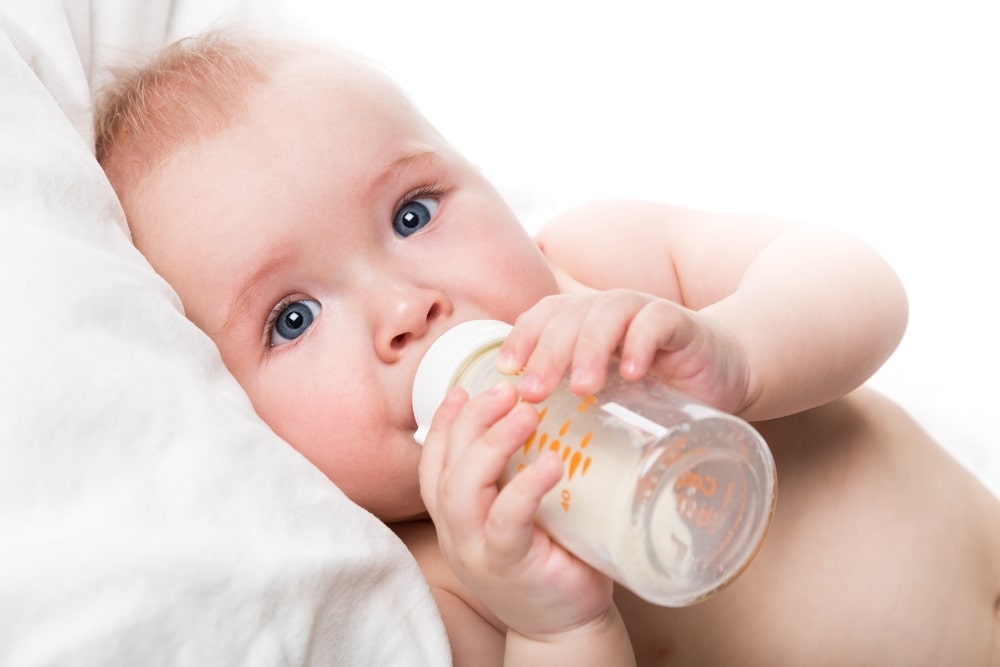
21. Question: Is a child with a disability under the age of three entitled to free children's meals?
Answer: The presence of a disability is not included in the list of categories eligible for free provision of baby food.
22. Question: Why can baby milk be stored for 3 months if it is an organic product and there are no additives?
Answer: The manufacturer of children's dairy products, ZMK JSC, uses an advanced heat treatment method - milk ultra-pasteurization. At the same time, vitamins and microelements are preserved in milk. Pathogenic microorganisms and spores are killed, which lead to rapid deterioration of the product.
The product is bottled in a multi-layer hermetic package, which ensures the storage of the product during the expiration date. The entire production and bottling process takes place under sterile conditions and in a closed system.





